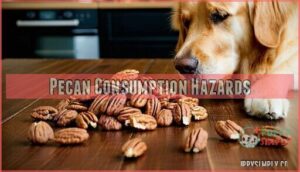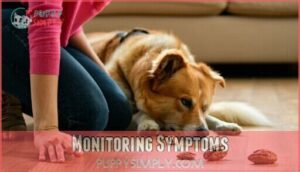This site is supported by our readers. We may earn a commission, at no cost to you, if you purchase through links.
 No, you can’t safely give your dog pecans.
No, you can’t safely give your dog pecans.
These nuts are like kryptonite for canines, containing toxic compounds that can trigger serious health problems.
When dogs eat pecans, they’re rolling the dice with pancreatitis, a painful condition caused by the nuts’ high fat content.
Pecans also harbor invisible mold toxins that can cause seizures and tremors.
Think of pecans as ticking time bombs in your pup’s digestive system – they can create blockages or become choking hazards, especially for smaller breeds.
Your furry friend deserves better than this risky gamble.
Smart dog parents know there are specific warning signs to watch for and safer alternatives that’ll keep tails wagging without the emergency vet visits.
Table Of Contents
- Key Takeaways
- Pecan Toxicity Risks
- Can Dogs Eat Pecans Safely
- Pecan Consumption Hazards
- Nutritional Concerns
- Safe Alternatives to Pecans
- Pecan Allergy Symptoms
- Emergency Response Guide
- Preventing Pecan Poisoning
- Frequently Asked Questions (FAQs)
- What Should I Do if My Dog Eats Pecans?
- Are Pecans Safe for Puppies?
- Are There Any Nutritional Benefits to Feeding My Dog Pecans?
- Are All Types of Nuts Unsafe for Dogs?
- Is Peanut Butter a Safe Alternative to Pecans?
- What should I do if my dog ate pecan pie?
- Are pecan shells more dangerous than the nuts themselves?
- How long do pecan poisoning symptoms take to appear?
- Can dogs eat pecans if theyre cooked or baked?
- Whats the difference between pecan and walnut toxicity in dogs?
- Conclusion
Key Takeaways
- Don’t give your dog pecans at all – they contain juglone, a toxic compound that causes vomiting, diarrhea, and neurological damage, plus they’re choking hazards that can create intestinal blockages
- Watch for emergency symptoms – if your dog accidentally eats pecans, look for vomiting, diarrhea, lethargy, tremors, or seizures and contact your vet immediately, even if your dog seems fine
- Prevent access completely – store pecans in secure, dog-proof containers and clean up any fallen nuts from your yard since even small amounts can trigger pancreatitis or mycotoxin poisoning
- Choose safer alternatives instead – offer your dog approved treats like seedless apples, carrots, lean cooked meats, or plain rice that won’t put their health at risk
Pecan Toxicity Risks
You shouldn’t give your dog pecans because they contain juglone, a toxic compound that can cause serious health problems including vomiting, diarrhea, and even neurological damage.
These nuts also carry high risks of pancreatitis due to their fat content and may contain dangerous mycotoxins from mold that can trigger seizures in dogs.
Juglone Toxicity
Juglone lurks in every part of the pecan tree, creating a hidden danger for your dog. This natural compound belongs to the naphthoquinone family and causes severe pecan toxicity dogs face when exposed.
Juglone hides in every pecan part, turning your dog’s curious snack into a dangerous toxicity trap.
Sensitive breeds suffer worse juglone effects, with toxicity levels varying by freshness and processing. As fallen nuts pose risks. Fresh pecans contain higher juglone concentrations than store-bought varieties.
- Compound causes lung hemorrhage at just 5mg per kilogram of body weight
- Neurological issues develop alongside digestive symptoms in affected dogs
- Long-term damage includes liver inflammation and respiratory complications
- Treatment options require immediate veterinary intervention for pecan poisoning dogs
Pancreatitis Risk
Your dog’s pancreas wasn’t designed for pecans’ fat overload.
These high-fat nuts trigger pancreatic inflammation, causing severe abdominal pain and vomiting.
Certain breeds face increased breed predisposition to pancreatitis from pecan toxicity.
Proper dietary management means avoiding all nuts completely.
Once pancreatitis strikes, recurrence prevention becomes critical.
Skip the pecans—immediate veterinary care beats dealing with painful pancreatic episodes later.
Mycotoxin Exposure
Beyond juglone’s dangers, pecans harbor another serious threat: mycotoxins from mold growth.
Aspergillus mold produces deadly aflatoxin, causing severe toxicity in dogs. You can’t always see mold on pecans, making toxin identification nearly impossible.
These mycotoxins develop during storage, creating spoilage risks that threaten your dog’s health.
Immediate veterinary attention is essential if dogs show signs of mycotoxin exposure.
Proper mold prevention requires keeping all pecans away from pets.
Neurological Damage
Mycotoxin Effects from pecan consumption can trigger severe Brain Damage in your dog’s nervous system.
These toxic compounds don’t just upset stomachs—they attack the brain directly.
Aflatoxin Impact creates Neurological Issues that escalate quickly, making pecans toxic dogs should never encounter.
Watch for these Seizure Triggers and Tremor Causes:
- Uncontrollable shaking or trembling
- Loss of coordination and balance
- Seizures lasting several minutes
- Disorientation and confusion
Can Dogs Eat Pecans Safely
The simple answer is no – dogs can’t eat pecans safely.
These nuts are toxic foods dogs should never consume, even in small amounts.
When your dog ate pecan, you’re dealing with serious nut toxicity that requires immediate attention.
Pecans are toxic to dogs because they contain juglone, a compound that causes severe digestive problems.
The pecan dangers dogs face include vomiting, diarrhea, and potential neurological issues.
Unlike some safe nuts for humans, pecans present multiple health risks that make them unsuitable for canine consumption.
You might wonder about pecan alternatives for treating your furry friend.
Focus on dog nutrition through safer options instead.
Treat safety means choosing foods specifically designed for dogs or veterinarian-approved snacks.
Are pecans bad for dogs? Absolutely.
The risks far outweigh any potential benefits, making prevention your best strategy for keeping your pet healthy.
Pecan Consumption Hazards
If you think choking is the only danger when your dog grabs a pecan, you’re missing several serious health risks that can turn a simple snack into an emergency vet visit.
Beyond the obvious choking hazard, pecans can cause intestinal blockages, expose your pet to dangerous molds, and trigger severe digestive problems that require immediate medical attention.
Choking Hazards
Those innocent-looking pecans pack a serious choking hazard for your furry friend.
The pecan size creates the perfect storm for dogs who gulp their food down without chewing properly.
Here’s what makes pecans particularly dangerous:
- Swallowing whole – Dogs often inhale food, making nut fragments deadly
- Shell risks – Hard pieces can lodge in throats
- Smaller dogs face heightened danger due to narrow airways.
Safety isn’t negotiable.
Intestinal Blockages
When dogs swallow pecans or pecan shells whole, they risk serious intestinal blockages that require emergency surgery.
Small dogs face higher risks since nut fragments can easily obstruct their narrow digestive tracts.
These blockages cause severe digestive issues, requiring immediate veterinary care and potentially costing thousands in surgery costs.
Dog pecan ingestion creates dangerous choking hazards beyond simple stomach upset, which can lead to serious health issues.
Mold Exposure
Beyond physical obstructions, pecans pose serious mold risks that many owners overlook.
Hidden mold produces dangerous mycotoxins, including deadly aflatoxin that causes neurological damage. You can’t always see spoilage signs on nuts.
Key prevention strategies include:
- Store pecans in airtight containers away from moisture
- Dispose of old or questionable nuts immediately
- Never let dogs eat pecans found outdoors
Gastrointestinal Upset
Within hours of eating pecans, your dog’s digestive system can rebel with violent vomiting and explosive diarrhea.
These digestive symptoms signal serious gastrointestinal upset that demands immediate attention. The severity factors depend on how many pecans were consumed and your dog’s size.
| Digestive Symptoms | Onset Time | Treatment Options |
|---|---|---|
| Vomiting | 2-6 hours | IV fluids, anti-nausea medication |
| Diarrhea | 4-12 hours | Bland diet, probiotics |
| Pancreatitis | 12-24 hours | Hospitalization, dietary changes |
| Abdominal pain | 6-18 hours | Pain management, monitoring |
The symptoms can vary in onset time, ranging from 2-6 hours for vomiting, 4-12 hours for diarrhea, 12-24 hours for pancreatitis, and 6-18 hours for abdominal pain.
Nutritional Concerns
Even if pecans weren’t toxic, their nutritional profile makes them unsuitable for dogs.
You’re looking at nuts packed with fat and calories that can quickly lead to weight gain, pancreatitis, and digestive problems in your pet.
High Fat Content
Pecans pack a hefty 20.4 grams of fat per ounce, making them a pancreatitis trigger for your dog.
This high fat content overwhelms canine digestive systems, causing immediate stomach upset and long-term health risks. Weight management becomes impossible when dogs consume these calorie-dense nuts regularly.
Many pet owners also give their dogs supplements; however, it’s vital to bear in mind supplement safety risks.
- Pancreatitis development – High fat nuts like pecans inflame the pancreas, requiring emergency veterinary care
- Digestive system overload – Dogs can’t process excessive fats, leading to diarrhea and vomiting
- Weight gain acceleration – Calorie control becomes difficult with high-fat pecan consumption
- Metabolic disruption – Fat intake affects blood sugar regulation and liver function
- Obesity concerns – Regular high-fat consumption contributes to dangerous weight gain in dogs
Calorie Density
Beyond their fat concerns, pecans pack a serious caloric punch that can derail your dog’s weight management goals.
These high-fat nuts contain nearly 700 calories per 100 grams, making portion control absolutely critical for obesity prevention.
| Nut Type | Calories per 100g | Daily Treat Limit* |
|---|---|---|
| Pecans | 691 kcal | 2-3 pieces max |
| Almonds | 579 kcal | 3-4 pieces max |
| Walnuts | 654 kcal | 2-3 pieces max |
*Based on 50lb dog’s energy intake
Treat calories from pecans can quickly lead to weight gain and elevated cholesterol levels in dogs.
Dehydration Risk
High-fat pecans can trigger severe diarrhea and vomiting, rapidly depleting your dog’s fluids and disrupting their electrolyte balance.
This dehydration stress impacts kidney function and creates dangerous complications.
Watch for these dehydration signs:
- Increased thirst and excessive panting
- Sticky or dry gums
- Loss of skin elasticity
- Lethargy or weakness
Seek immediate veterinary care if you notice these symptoms.
Obesity Risk
Your dog’s waistline suffers when pecans enter the picture.
These high-fat nuts pack serious calories that quickly lead to weight gain without proper calorie control.
Since pecans aren’t safe for dogs anyway, you’re dodging both toxicity risks and obesity concerns.
Focus on portion sizes with approved treats instead.
Your pup’s exercise needs won’t overcome pecan’s dietary impact on their expanding belly, making proper calorie control essential.
Safe Alternatives to Pecans
You don’t need to worry about finding safe treats for your dog when you know which healthy alternatives work best.
Fresh fruits like seedless apples and blueberries, vegetables such as carrots and green beans, cooked lean meats, and whole grains like plain rice offer nutritious options that won’t put your pet at risk.
Fresh Fruits
Your dog’s sweet tooth craves better options than dangerous pecans.
Safe fruits like seedless apples, bananas, and blueberries offer natural sweetness without toxic risks. Remove seeds from all fruit portions to prevent choking.
These fruit benefits include vitamins and antioxidants while avoiding allergens.
Discover more dog-safe fruits for varied healthy options.
Always introduce new treats gradually, monitoring for reactions during your dog nutrition guide journey.
Vegetables
Crunchy carrots and green beans offer excellent vegetable benefits as safe alternatives.
These safe veggies provide essential nutrients without pecan risks.
Sweet potatoes and cucumber slices make perfect low-calorie dog treats.
Remember proper veggie preparation – steam vegetables for easier digestion and maintain portion control.
Many owners find it useful to buy pre-made options for convenience.
This veggie variety supports dog nutrition and health while keeping your furry friend away from toxic foods for dogs, ensuring ideal dog safety.
Cooked Meats
Protein-packed alternatives offer a healthier path than risky pecans. Lean proteins provide essential nutrients without dangerous toxins that threaten dog health.
Proper preparation methods guarantee your furry friend gets safe, nutritious treats. Many owners prioritize safe sources of protein for their pets.
- Plain chicken breast – Remove skin and bones, cook thoroughly without seasoning
- Turkey pieces – Avoid processed varieties, stick to fresh, unseasoned meat
- Cooked fish – Choose low-mercury options like salmon, remove all bones
- Lean beef – Trim visible fat, cook well-done to eliminate bacteria
Whole Grains
Beyond protein treats, whole grains offer excellent alternatives to high-fat nuts like pecans.
These options won’t trigger pancreatitis in dogs and provide steady energy without digestive upset.
| Safe Grain | Serving Benefits |
|---|---|
| Cooked White Rice | Easy digestion, settles stomach |
| Plain Oatmeal | Fiber-rich, heart-healthy option |
| Cooked Quinoa | Complete protein, gluten-free choice |
| Brown Rice | Added nutrients, sustained energy |
Always practice portion control with any safe foods.
Pecan Allergy Symptoms
If your dog accidentally eats pecans, you’ll need to watch for several warning signs that indicate pecan poisoning.
These symptoms can appear quickly and range from mild digestive upset to serious neurological problems that require immediate veterinary attention, including serious neurological problems.
Vomiting
When your dog consumes pecans, vomiting often becomes the first red flag signaling trouble.
This immediate response helps protect your pet’s system, but persistent vomiting requires urgent veterinary care.
Watch for these vomiting patterns:
- Repeated episodes within hours of pecan consumption
- Bile or blood mixed with vomit contents
- Dry heaving when stomach empties completely
Vomiting severity determines treatment urgency for pecans safe dogs concerns.
This could be due to the immune system mistakenly identifying a protein as a threat, causing gastrointestinal problems.
Diarrhea
Loose, watery stools often follow vomiting when your dog consumes pecans.
This diarrhea causes rapid dehydration, making the situation more serious.
The severity depends on how many pecans your pup ate.
Treatment requires immediate veterinary care to prevent dangerous fluid loss.
Can dogs have pecans safely? Absolutely not.
Prevention means keeping these nuts completely away from curious noses to prevent rapid dehydration and ensure immediate veterinary care is available if needed.
Lethargy
After diarrhea subsides, you’ll notice your dog becoming unusually tired. This post-ingestion lethargy develops as your pet’s body fights pecan toxicity. The pecan lethargy link stems from your dog’s immune system working overtime to process harmful compounds.
Watch for these lethargy severity scale indicators:
- Your normally playful pup won’t fetch their favorite toy
- They’re sleeping through dinner time – that’s serious
- Walking to their water bowl seems like climbing Mount Everest
- Your energetic companion can’t muster enthusiasm for walks
- They’re choosing sleep over greeting you at the door
This lethargy duration varies, but don’t wait it out. Professional lethargy treatment options exist, so contact your vet immediately when dog pecan symptoms include this exhaustion alongside other dog symptoms you’ve observed.
Abdominal Pain
Discomfort strikes your dog’s belly like a storm after pecan consumption.
You’ll notice your pup hunching their back, whimpering when touched, or showing reluctance to move.
Pain location typically centers around the abdomen, with severity ranging from mild discomfort to intense cramping.
Pain duration can persist for hours or days.
Associated symptoms include vomiting and lethargy, signaling potential pancreatitis requiring immediate veterinary care.
Emergency Response Guide
If your dog eats pecans, you’ll need to act quickly to prevent serious health problems.
Contact your veterinarian immediately, even if your dog seems fine, because pecan toxicity can cause vomiting, diarrhea, tremors, and dangerous complications that require professional treatment.
This situation demands urgent attention, and professional treatment is necessary to address the potential health issues that may arise.
Immediate Veterinary Care
When pecan symptoms appear, don’t wait to see if they’ll pass. Contact your Emergency Vet immediately, even if it’s late at night.
Symptom Severity and Toxin Levels determine Treatment Options, so quick action matters most.
- Call your regular vet first, then emergency clinic if closed
- Describe exact symptoms and amount consumed
- Ask about Follow-up Care scheduling
Veterinary care saves lives when pecan poisoning strikes.
Monitoring Symptoms
After getting veterinary care, watch your dog like a hawk for the next 24-48 hours.
Symptom severity can escalate quickly, and delayed reactions aren’t uncommon. Monitor behavioral changes, hydration levels, and appetite changes closely.
Dog pecan symptoms may worsen before improving. Note any dog distress signs – tremors, excessive drooling, or restlessness.
Document everything for your vet’s follow-up dog monitoring and ongoing dog veterinary care.
Preventing Ingestion
Prevention beats treatment in the context of dog pecan safety.
You’ll protect your furry friend by creating barriers between them and these dangerous nuts.
- Secure storage in dog-proof containers keeps pecans away from curious paws
- Yard cleanup removes fallen nuts that tempt exploring dogs during walks
- Educate family members about dog health risks to prevent accidental feeding
Pet Insurance
When facing unexpected veterinary bills from pecan poisoning, pet insurance becomes your financial safety net.
Coverage options vary widely, with policy costs depending on your dog’s breed and age.
The claim process typically reimburses 70-90% of expenses after you’ve paid upfront.
However, schnauzer pet insurance can cover breed-specific issues.
Breed restrictions and pre-existing conditions may limit coverage, so research thoroughly before choosing a plan.
Preventing Pecan Poisoning
You can protect your dog from pecan poisoning by taking simple steps around your home and yard.
Store pecans in secure containers your dog can’t reach, clean up fallen nuts from outdoor areas.
Make sure everyone in your household knows pecans are dangerous for pets.
Secure Storage
Store your pecans in airtight containers with childproof locks on elevated shelves where curious paws can’t reach.
Dog-proof bins work better than regular storage for determined sniffers.
Clean up any spill cleanup immediately – even one dropped pecan poses risks.
These simple dog health tips and pet safety measures protect your furry friend from accidental ingestion and potential poisoning.
Yard Cleanup
Your backyard can become a pecan minefield if you’ve got trees dropping nuts everywhere.
Remove fallen pecans immediately since they’re choking hazards and contain juglone, which harms dogs.
Don’t toss shells into compost – they create mold that’s dangerous.
Regular tree maintenance prevents excessive dropping. Check under bushes where pecans hide, as mold prevention starts with thorough shell removal to prevent mold.
Educating Household Members
Everyone in your home needs to understand that pecans are toxic to dogs.
Share this Pecan Awareness knowledge with children, guests, and babysitters through clear Child Education conversations.
Establish Family Protocols about not feeding dogs table scraps containing pecans.
Give Guest Instructions about toxic nuts for dogs when they visit.
Create Shared Responsibility by posting dog pecan safety tips on your refrigerator.
Consulting Veterinarians
Your vet’s expertise becomes invaluable when creating a safe environment for your dog.
Professional veterinary advice guarantees you understand which treats pose risks and which provide benefits.
Here’s what to discuss with your veterinarian:
- Safe treat alternatives that match your dog’s dietary needs
- Emergency protocols for accidental pecan ingestion incidents
- Follow-up care requirements and medication safety guidelines
Frequently Asked Questions (FAQs)
What Should I Do if My Dog Eats Pecans?
An ounce of prevention’s worth a pound of cure.
Contact your veterinarian immediately if your dog eats pecans, even small amounts.
Don’t wait for symptoms – pecans contain toxins that can cause serious digestive and neurological problems, as they can lead to severe health issues, making immediate action crucial for your dog’s well-being.
Are Pecans Safe for Puppies?
Puppies shouldn’t eat pecans at all.
Their smaller size makes them more vulnerable to choking, blockages, and toxicity from juglone and mycotoxins.
Even tiny amounts can cause serious digestive and neurological problems requiring emergency care.
Are There Any Nutritional Benefits to Feeding My Dog Pecans?
Practically pointless pecans provide no unique nutritional benefits for your dog.
While they contain protein and healthy fats, safer alternatives like lean meats offer better nutrition without the serious toxicity risks pecans pose, including the risk of toxicity.
Are All Types of Nuts Unsafe for Dogs?
Not all nuts are unsafe, but most pose risks you shouldn’t ignore.
Peanuts are technically safe in small amounts, while macadamias, walnuts, and pecans are toxic.
Skip nuts entirely—safer treats exist.
Is Peanut Butter a Safe Alternative to Pecans?
Like finding a safe harbor in stormy waters, peanut butter can be a better choice than pecans.
You’ll want xylitol-free varieties in moderation, but it’s generally safer for your dog’s digestive system.
What should I do if my dog ate pecan pie?
Contact your veterinarian immediately.
Pecan pie contains toxic pecans plus dangerous ingredients like chocolate and xylitol.
Don’t wait for symptoms.
Monitor your dog closely for vomiting, diarrhea, or tremors while seeking professional help.
Are pecan shells more dangerous than the nuts themselves?
Pecan shells pose greater risks than the nuts themselves.
They’re indigestible, causing dangerous intestinal blockages requiring surgery.
Shells also carry choking hazards and toxic molds.
Both parts are harmful, but shells create more serious emergency situations.
How long do pecan poisoning symptoms take to appear?
Symptoms typically show up within hours after your dog eats pecans. You’ll notice vomiting and diarrhea first, followed by lethargy. Neurological signs like tremors can develop later, so watch closely.
Can dogs eat pecans if theyre cooked or baked?
No, cooking or baking doesn’t make pecans safe for dogs.
Heat doesn’t eliminate the toxic juglone compound or reduce choking hazards.
Cooked pecans still pose serious risks including poisoning, pancreatitis, and intestinal blockages.
Whats the difference between pecan and walnut toxicity in dogs?
Both nuts contain juglone, but walnuts pose greater risks.
They’re more susceptible to dangerous molds producing mycotoxins that cause tremors and seizures.
Pecans mainly cause digestive upset, while walnuts trigger severe neurological symptoms requiring immediate veterinary care.
Conclusion
Remember, regarding the question of "can dogs eat pecans safely," the answer is a resounding no. These nuts are like loaded dice in your pet’s health game.
Keep pecans securely stored and your yard clean of fallen nuts. If your dog accidentally eats pecans, watch for symptoms like vomiting, lethargy, and seizures.
Contact your veterinarian immediately. Choose safer alternatives like carrots, apples, or lean meats for treats. Your dog’s safety depends on your vigilance and smart choices.


















